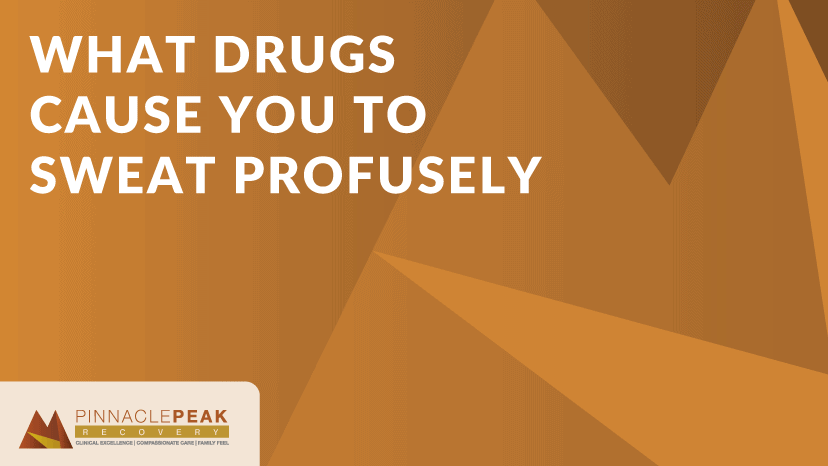You know that you like to indulge a little bit. Maybe a few hefty drinks on the weekend, some pills here and there to take the edge off, and some bumps of cocaine when the coffee isn’t cutting it. You don’t see it as an issue but at the same time, it’s rare when you don’t have something in your system. Lately, you haven’t been doing so well at work and decide to cut back on your drug use.
For the most part, everything is okay and you are managing rather well. But for some reason, almost like clockwork, you break out in a sweat every afternoon around the same time. Your hands are clammy, your forehead glistening, and you wonder how strong your deodorant really is. Once you get off work and get home to a drink or a pill, the sweating seems to get better. What is going on?
In Maricopa County, over 80% of overdose deaths involved more than one substance in 2021. This number has seen a steady increase over the last 8 years. At Pinnacle Peak Recovery, we are working to educate our community on the dangerous symptoms of addiction. Today, we are discussing one of the common symptoms of addiction: profuse sweating. What drugs cause you to sweat profusely? Let’s take a look and find out.

Common Causes of Secondary Hyperhidrosis
Secondary hyperhidrosis refers to a condition in which the body produces excess sweat that is not associated with heat or exercise. The sweating is usually localized to the hands, feet, face, and underarms and occurs on both sides of the body. These episodes usually happen at least once a week while awake. Some medical conditions can cause this such as:
- Diabetes
- Infection
- Menopause
- Nervous system disorders
- Thyroid complications
- Some forms of cancer
If you have any of these conditions, you are probably already seeing a doctor about them. They can help with controlling secondary hyperhidrosis to help alleviate excess sweating.
In some instances, secondary hyperhidrosis is caused by certain medications. Opioids, antidepressants, and hormonal medications can cause excessive sweating as a side effect. Even some antibiotics can cause sweating. If the sweating becomes bothersome, talk to your doctor about the medications you are taking to find a solution.
Sweating as a Symptom of Addiction
Certain substances will cause excessive sweating more than others. Opioids and alcohol cause sweating because they inhibit the brain from regulating body temperature. As a way to compensate, the body starts overproducing sweat to help find a balance.
Withdrawal can also cause sweating in addiction. Sweating is especially common in alcohol withdrawal due to the brain not sending signals to the kidneys to retain fluids. This results in the body expelling excess fluid through increased urination and sweating.
Sweating is also a way for the body to rid itself of toxins. As the liver is working to detoxify, it is increasing the production of urine and sweat. This helps the body get rid of the substances and return to a normal balance.
Symptoms That Accompany Sweating in Addiction Cases
Common symptoms that accompany sweating are:
- Increased anxiety
- Paranoia
- Chills
- Shaking
- Confusion
- Delusions
If the person taking substances is not properly hydrating while experiencing excess sweating, the body will become dehydrated. Severe dehydration can cause physical problems such as falls or unconsciousness as well as mental delusions and hallucinations.
When to Seek Medical Attention for Hyperhidrosis
Certain substances, such as heroin, cause the blood vessels to increase the rate of blood flow throughout the body. This can result in a spike in heart rate, which can raise the temperature of the surface of the skin. At this point, the increased heat will cause profuse sweating and can be an indicator of a more serious issue such as a heart attack.
If you notice that you have never had an issue with sweating while taking substances but now suddenly you do, it is best to seek medical attention. This is a sign of a more serious condition happening within the body.
Lastly, if you are sweating profusely while not taking substances, seek medical attention. This is a sign of withdrawal and it is unsafe to continue without medical intervention. For those who use alcohol, opioids, and benzodiazepines, this is especially crucial. Seizures can happen during the withdrawal process and medical intervention is necessary.
Getting Treatment for Substance Use Disorder
Substance use disorder does not define who you are. At Pinnacle Peak Recovery, we focus on you as a person and tailor our program to what will work for your unique needs. We have programs for all forms of substance use disorder, and our staff can provide dual-diagnosis treatment. When you come to Pinnacle Peak, you can expect:
Assessment – each client who comes to Pinnacle Peak Recovery will receive an assessment before starting treatment. This allows us to come up with a plan for success based on the client’s individual needs. No two clients are the same, and our treatment approach reflects personal care during all stages.
Detox treatment – our detox program is medically supervised and implements daily therapy. We work with each individual as this can be the most uncomfortable part of treatment. Detox can last days, and our staff is available around the clock for support.
Inpatient rehab – structured 24/7 onsite inpatient treatment program, where the work begins. Our facility has licensed therapists and focuses on cognitive behavioral therapy and dialectical behavioral therapy. These therapies help with coping skills and changing the way problems are viewed and handled. We also strive for a family environment and are here every step of the way. Life skills classes and a set schedule help clients get a sense of being back on track. Clinicians are available to address behavioral health issues as well as work with substance use disorder. Everything a client needs is conveniently in one place.
Outpatient rehab – for those who cannot get away from work or home. We use the same guiding principles that make up our inpatient program. Therapies and behavioral health treatment as well as substance use disorder classes are offered for this program. The client will commute for treatment every day as opposed to staying in our facility. Each individual will be evaluated for the course of treatment and given the same family approach to care. Our outpatient rehab program lasts as long as the client needs.
Mental health services – dual diagnosis offerings and treatments. Mental health disorders and substance use disorders go hand in hand. Our mental health treatment facility is equipped to treat both and use individualized treatment plans for each client.
Continuum of care – at Pinnacle Peak Recovery, we believe success comes from continued care. We encourage all alumni and their families to come to weekly meetings and stay involved with the recovery community.
Is Your Loved One Suffering From Substanse Use Disorder? Give Us A Call Today!
Family value is our top priority at Pinnacle Peak Recovery. We believe in treating our clients as people, not problems. Our staff has helped many to pave the road to recovery from substance use disorder. If you or someone you know seems to be living with profuse sweating, this may be a sign of addiction. Call us today 866-377-4761 to hear more about how we can help.


